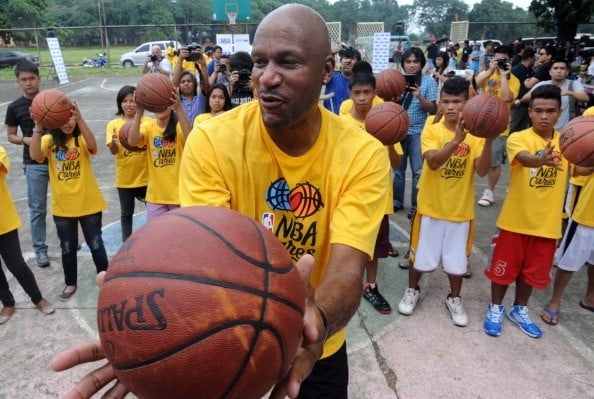What is Ron Harper's net worth?
Ron Harper is a retired American professional basketball player who has a net worth of $12 million. Ron Harper built a legacy as both a high-scoring guard early in his career and a key defensive contributor on five NBA championship teams. Over 15 seasons, he played more than 1,000 games and carved out a reputation as a selfless, adaptable, and quietly effective presence on the court. While never the most famous name on the roster, Harper was a critical piece on dynasties led by Michael Jordan's Chicago Bulls and Shaquille O'Neal's Los Angeles Lakers.
Known for his athleticism, defensive versatility, and high basketball IQ, Harper averaged 13.8 points, 4.3 rebounds, 3.9 assists, and 1.7 steals per game over the course of his career. His ability to evolve—from an explosive scorer to a trusted veteran role player—made him one of the NBA's most quietly valuable contributors during the 1990s.
Early Life and College Career
Ronald Harper was born on January 20, 1964, in Dayton, Ohio, and raised in Kettering. One of six siblings raised by a single mother, Harper faced challenges from a young age but found a passion for basketball that propelled him to prominence.
Harper starred at Kiser High School and later at Miami University (Ohio), where he became one of the most decorated players in school history. He averaged over 20 points per game in college and graduated as the RedHawks' all-time leading scorer. His elite two-way play and athleticism made him a highly regarded NBA prospect.
NBA Career
Harper was selected eighth overall in the 1986 NBA Draft by the Cleveland Cavaliers. He made an immediate impact, averaging 22.9 points per game as a rookie and emerging as one of the league's top young guards. Alongside Brad Daugherty and Mark Price, Harper helped turn the Cavaliers into a playoff contender.
In 1989, the Cavaliers made a surprising decision to trade Harper to the Los Angeles Clippers. Despite a serious ACL injury early in his tenure with the Clippers, Harper bounced back and remained productive, averaging over 18 points per game during his time in Los Angeles.
In 1994, Harper signed with the Chicago Bulls, where he transitioned into a new role under head coach Phil Jackson. No longer the focal point of the offense, he became a lockdown defender and calming presence in the backcourt, starting on three straight championship teams from 1996 to 1998.
When Jackson took over the Los Angeles Lakers in 1999, Harper followed, serving as a veteran leader on two more championship squads in 2000 and 2001. He retired after the 2000–01 season, ending his career with five NBA titles.

DIRECTO/AFP/Getty Images
Contracts, Salary & Career Earnings
Over his 15-year NBA career, Ron Harper Sr. earned a total of $34,935,000 in salary. That figure, while significant at the time, is modest compared to the earnings of modern NBA players.
In June 2025, his younger son, Dylan Harper, was selected with the No. 2 overall pick in the NBA Draft by the San Antonio Spurs. Dylan, a 6'6″ guard who averaged nearly 20 points per game in his freshman season at Rutgers, signed a rookie contract worth $56.18 million over four years. That figure is fully guaranteed—and nearly $21 million more than his father earned in his entire 15-season career.
While inflation adjustments narrow the gap slightly, the numbers are still a striking testament to the NBA's financial growth. Harper Sr. helped lay the groundwork for the modern era, and his son now reaps the rewards of that evolution.
Notably, Ron Harper Sr. now has two sons in the NBA: Dylan, the high-profile rookie; and Ron Harper Jr., who went undrafted in 2022 and currently plays for the Detroit Pistons.
Post-Playing Career
After retiring, Harper briefly entered coaching and served as an assistant with the Detroit Pistons under Larry Brown. He has remained active as a mentor to young players and has been involved in community outreach and motivational speaking, often sharing his story of perseverance.
He has also spoken publicly about his lifelong battle with a speech impediment, using his platform to encourage others with similar challenges. His resilience off the court has drawn as much respect as his accomplishments on it.
/2015/07/Ron-Harper.jpg)
/2014/09/ec.jpg)
/2010/11/joe-dumars.jpg)
/2015/03/Jamaal-Wilkes1-e1613413099673.jpg)
/2016/01/Kyle-Singler.jpg)
/2020/05/Luc-Longley.jpg)
/2020/10/neil-young.jpg)
/2023/05/Gary-Numan.jpg)
/2021/01/Daryl-Hannah.jpg)
/2014/09/Jarvis-Cocker.jpg)
/2020/03/lyl.jpg)
/2024/05/Ilia-Topuria.jpg)
/2010/05/dc.jpg)
/2010/12/John-Fogerty.jpg)
/2022/03/Stephen-Stills.jpg)
/2015/05/jh.jpg)
/2022/06/Graham-Nash.jpg)
/2015/07/Ron-Harper.jpg)
/2014/09/ec.jpg)
/2010/11/joe-dumars.jpg)
/2014/10/Derek-Anderson.jpg)
/2009/11/Brandon-Jennings.jpg)
/2013/12/Carlos-Boozer.jpg)
/2014/08/GettyImages-53000342.jpg)